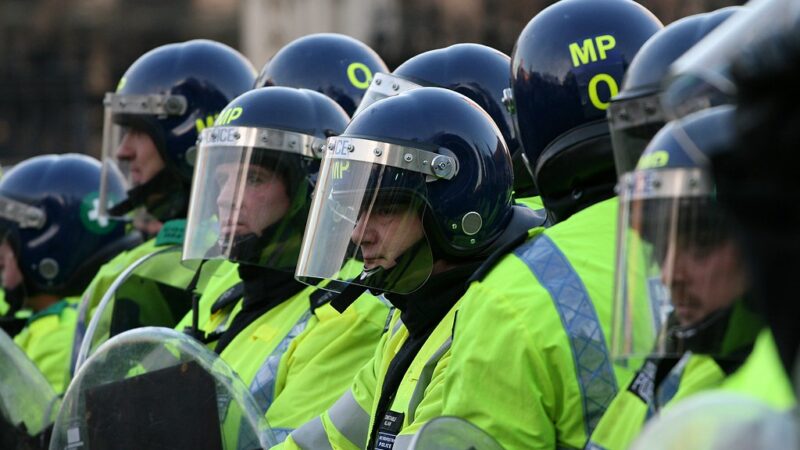As protests against police brutality spread like wildfire across the world, the concept of defunding the police is gaining visibility

We are now into our fourth week of mass global protests – in the US, the UK and elsewhere – against systemic racism and police brutality, following widespread outrage over the killing of George Floyd in the US by a Minneapolis police officer.
Organised in large part by the Black Lives Matter (BLM) movement, the protestors have cohered around a common rallying cry as one of their core aims: defund the police. Radical as it may sound to many, this idea is not new. Activists such as Mariame Kaba, Angela Davis and Ruth Wilson Gilmore have been advocating for the abolition of the prison-industrial complex (PIC) for decades, of which the police force is a key component.
Although the terms are often conflated, abolition can be thought of as the logical endpoint of defunding. Both rest on the idea that public safety would be better served by redirecting the huge sums spent on policing and incarceration into community initiatives, such as social work, healthcare, housing, infrastructure and employment.
Numerous instances indicating a causal link between greater police numbers and higher crime rates have done little to dispel the widely held belief, commonly expressed in government policy, that more police lead to safer streets.
The UK’s falling crime rate circa 2013-14 baffled commentators and experts alike, with many theories touted to explain the unexpected decline. Not one considered the impact of the austerity-triggered fall in police numbers happening at exactly the same time.
Police reform has not worked
One of the main justifications put forward for defunding and abolition is that police reform has been tried already – and failed. The Macpherson report, commissioned in 1997 to investigate the murder of Stephen Lawrence, branded the Metropolitan Police Service “institutionally racist” and made 70 recommendations designed to combat racism in the police force.
Over 20 years later, what do we have to show for it?
Black people in the UK are 40 times more likely to be stopped and searched by the police than white people, nine times more likely to be jailed, and five times more likely to have force used against them. BAME individuals constitute 25 % of the prison population (rising to 50 % amongst young offenders), despite making up just 14 % of the population.
The deaths of Sean Rigg, Christopher Alder, Rashan Charles, Edson Da Costa, Kingsley Burrell and Sheku Bayoh all occurred after the use of forceful restraint by police officers. None of the officers involved in these killings have been convicted (nor has any officer involved in a death in custody since 1969 – 1,743 deaths ago).
Defunding is constructive, not destructive
Although the police are generally considered a fundamental feature of our modern society, it is important to consider their relatively recent origins. Alex Vitale, author of The End of Policing, has noted that what we think of as the contemporary police force began in the early nineteenth century, “in direct relationship to the three primary systems of economic exploitation during that time period: colonialism, slavery, and the rise of industrialization. Policing develops to make those regimes of accumulation and exploitation possible.”
Still, the thought of dismantling the police no doubt remains a frightening prospect for many people. It should therefore be emphasised that such a process must be accompanied by the strengthening of other institutions, social programs which would focus on treatment and empowerment of disadvantaged individuals, rather than punishment.
Models already exist for a more holistic treatment of societal issues. Portugal’s drug decriminalisation program – focusing on treatment and support for drug users – led to a 92% decrease in overdose deaths between 1999 and 2016. Scotland’s Violence Reduction Units (VRUs) approached knife crime as a public health issue focusing on social work, healthcare and education Ten years later, the number of homicides in Scotland had more than halved, while in Glasgow teenage deaths from knives were all but eliminated.
The decriminalisation of illicit substances, if implemented, would have profoundly liberating consequences for BAME communities anywhere they find themselves unfairly targeted by drug laws. As for knife crime, although the UK has finally – 14 years after Scotland – implemented VRUs across the country, the funding is small-scale (£35 million initially; total funding for the police will exceed £15 billion this year).
Perhaps the most important legacy of the George Floyd protests will be the shifting of the Overton window around the nature of policing and public safety. Before last month, the words “defund” or “abolish” would not be placed anywhere near the vicinity of “police”, save for in a couple of fringe academic and activist groups. Now, these ideas are being openly discussed by every major news outlet.
Most politicians on the left have proven themselves incapable of giving even meagre support to this movement, offering instead feeble reforms that demonstrate the narrowness of the range of debate they operate in. Liberal thinkers, who broadly support reform but balk at abolition, have asked why we can’t just model our carceral system on the more effective and human institutions seen in Scandinavia. However, these countries only achieved their penal reforms thanks to a determined prison-abolition movement. It stands to reason, therefore, that those who truly desire police reform should be agitating for abolition; because the people who truly desire abolition seek nothing less than a wholesale restructuring of society.
Will Hayes is a freelance journalist
To reach hundreds of thousands of new readers we need to grow our donor base substantially.
That's why in 2024, we are seeking to generate 150 additional regular donors to support Left Foot Forward's work.
We still need another 117 people to donate to hit the target. You can help. Donate today.



